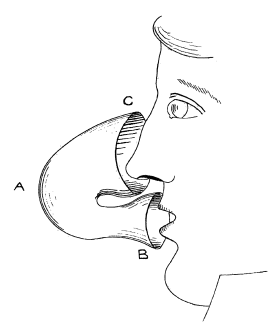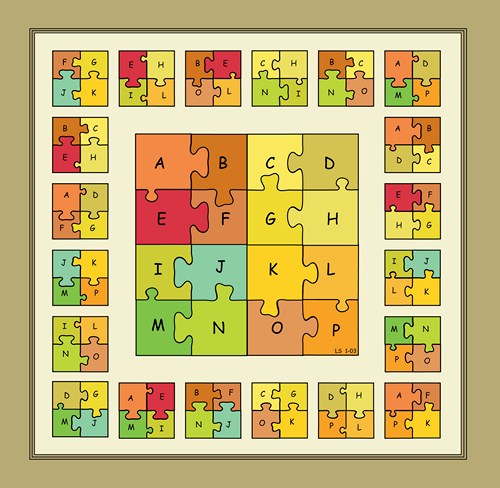
In 2009 British artist Roger Hiorns won the Turner Prize by melting a passenger aircraft engine, pouring it through a funnel, and spraying it with water to break it into fine granules.
Its dimensions are listed as “variable.”

In 2009 British artist Roger Hiorns won the Turner Prize by melting a passenger aircraft engine, pouring it through a funnel, and spraying it with water to break it into fine granules.
Its dimensions are listed as “variable.”
A charming little scene from mathematical history — in 1615 Gresham College geometry professor Henry Briggs rode the 300 miles from London to Edinburgh to meet John Napier, the discoverer of logarithms. A contemporary witnessed their meeting:
He brings Mr. Briggs up into My Lord’s chamber, where almost one quarter of an hour was spent, each beholding the other with admiration, before one word was spoke: at last Mr. Briggs began. ‘My Lord, I have undertaken this long journey purposely to see your person, and to know by what engine of wit or ingenuity you came first to think of this most excellent help unto Astronomy, viz. the Logarithms: but my Lord, being by you found out, I wonder nobody else found it before, when now being known it appears so easy.’
Their friendship was fast but short-lived: The first tables were published in 1614, and Napier died in 1617, perhaps due to overwork. In his last writings he notes that “owing to our bodily weakness we leave the actual computation of the new canon to others skilled in this kind of work, more particularly to that very learned scholar, my dear friend, Henry Briggs, public Professor of Geometry in London.”
A man presents himself as the The Amazing Sand Counter. He claims that if you put some quantity of sand into a bucket, he will know at a glance how many grains there are, but he won’t tell you the number. Can you devise a test that can verify this ability without telling you anything that you don’t already know? You can ask the Sand Counter to leave the room or turn away, for example, and you can ask him questions. How can you convince yourself that he knows how many grains of sand are in the bucket when he won’t actually tell you the number?

Xavier Henry Leder, who declares himself “by profession a seaman,” patented this “foul breath indicator” in 1902, perhaps after inventing it for his own use.
“It is an appliance in the shape of a tube, made of any non-absorbent material and curved so as to transmit without any obstruction the breath from the mouth to the nostrils. … By breathing from the mouth through the tube any foulness or unpleasant state of the breath may be readily detected by the sense of smell.”
The hard part is exhaling and inhaling at the same time.
“The greatest deception men suffer is from their own opinions.” — Leonardo
“Convictions are more dangerous enemies of truth than lies.” — Nietzsche
“Opinions have caused more ills than the plague or earthquakes on this little globe of ours.” — Voltaire
“The most difficult subjects can be explained to the most slow-witted man if he has not formed any idea of them already; but the simplest thing cannot be made clear to the most intelligent man if he is firmly persuaded that he knows already, without a shadow of doubt, what is laid before him.” — Tolstoy
“Nothing is so firmly believed as that which we least know.” — Montaigne
“Opinions are made to be changed, or how is truth to be got at?” — Lord Byron
“Nothing is more conducive to peace of mind than not having any opinions at all.” — G.C. Lichtenberg

We had a dark grey cat (Norfolk bred, very Norfolk in character) called Tom. He was reserved, domineering, voluptuous — much as I imagine Tiber to be. When he was middle-aged he gave up nocturnal prowlings and slept on my bed, against my feet. One evening I was reading in bed when I became aware that Tom was staring at me. I put down my book, said nothing, watched. Slowly, with a look of intense concentration, he got up and advanced on me, like Tarquin with ravishing strides, poised himself, put out a front paw, and stroked my cheek as I used to stroke his chops. A human caress from a cat. I felt very meagre and ill-educated that I could not purr. It had never occurred to me that their furry love develops from what was shown them as kittens.
— Sylvia Townsend Warner, letter to David Garnett, June 18, 1973, quoted in The Oxford Book of Friendship

A “self-interlocking” geomagic square by Lee Sallows. The 16 lettered pieces pave a single large square, and smaller squares can be produced by various groups of four pieces — those drawn from each row, column, and long diagonal, and 10 other symmetrically chosen quartets.

greenswardsmanship
n. the cultivation of an unusually and enviably excellent lawn
A mother is 21 years older than her son. Six years from now, she will be five times his age. Where’s the father?
I won’t give the answer to this one — if you do the math, you’ll know precisely where he is.
On Dec. 1, 1948, a well-dressed corpse appeared on a beach in South Australia. Despite 66 years of investigation, no one has ever been able to establish who the man was, how he came to be there, or even how he died.
In this episode of the Futility Closet podcast we’ll delve into the mystery of the Somerton man, a fascinating tale that involves secret codes, a love triangle, and the Rubaiyat of Omar Khayyam. We’ll also hear Franklin Adams praise the thesaurus and puzzle over some surprising consequences of firing a gun.